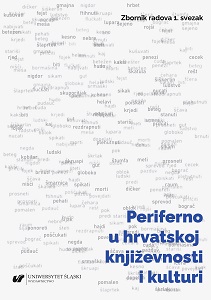Zagorac kao lik periferije u kontekstu kajkavske dopreporodne svjetovne književnosti i hrvatskoga književnog kanona 20. stoljeća
Zagorac as a Peripheral Literary Character in the Context of Kajkavian Secular Literature of the Pre-Illyrian Movement Period and the Croatian Literary Canon of the 20th Century
Author(s): Kristina Jug
Subject(s): Croatian Literature, Theory of Literature
Published by: Wydawnictwo Uniwersytetu Śląskiego
Keywords: Kajkavian literature; peripheral literary character; Miroslav Krleža; Jakob Lovrenčić; anonymous Kajkavian drama adaptation
Summary/Abstract: Kajkavian literature of the pre-Illyrian movement was often seen as a less valuable segment of national literature and for that reason was already placed in a peripheral literary phenomenon. That literature often was underestimated because of religious character, utilitarianism and didactics. In the 20th century, when the dialectical literature emerged, Kajkavian literature was recognised as equal in Croatian literature.
The main purpose of the paper is the analysis of peripheral literary characters who were appearing in the Enlightenment period in Kajkavian literature at the end of the 18th and beginning of the 19th century. In that period secular topics were included in the Kajkavian literature and reached its culmination, especially in the drama. The paper will explore which literature types are represented by these literary characters and which civic values they represent. The analysis will cover several titles from the secular Kajkavian prose and drama from the late 18th and beginning of the 19th centuries, a work entitled Adolf iliti kakvi su ljudi by Jakob Lovrenčić and Kajkavian drama adaptations performed on the stage of the school theatre at Kaptol Roman-Catholic Preparatory.
The Illyrian movement forcefully and deliberately stopped Kajkavian literary production. Immediately after the Illyrian movement Kajkavian language was used to characterize a type of literary character whose purpose was mocking and creating a comic effect. The work will explore at which moment the literary characters of Kajkavian peripheries become inspirational to Croatian writers as representatives of a certain milieu and worldview. Particularly interesting will be the analysis of literary characters from the collection of stories Croatian God Mars by Miroslav Krleža and the paper will answer the question on the universal values of the literary characters of Kajkavian periphery and their purpose in the national literature.
Book: Periferno u hrvatskoj književnosti i kulturi / Peryferie w chorwackiej literaturze i kulturze
- Page Range: 248-271
- Page Count: 24
- Publication Year: 2021
- Language: Croatian
- Content File-PDF

